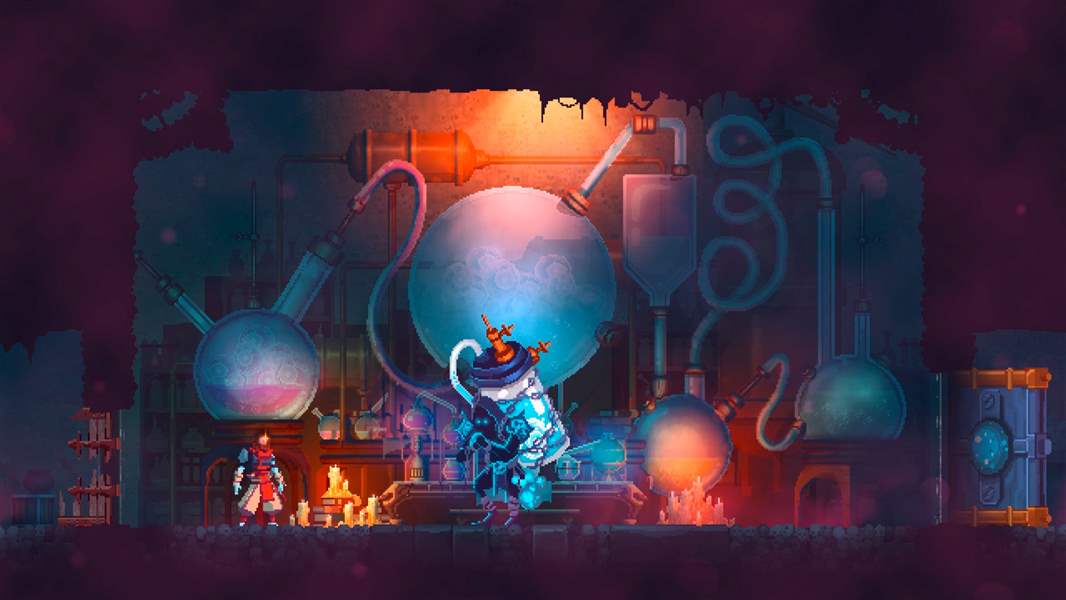
WEEKENDER I GAME ON
'Dead Cells' reinvents a popular genre
8/15/2018
Screen grab from 'Dead Cells.'
MOTION TWIN
I hate the term “Metroidvania.” It’s a generic, lazy label that lumps together any games with a Super Nintendo-era aesthetic as some kind of shorthand introduction about how said game plays.
There’s a presumption involved with the moniker that Metroid and Castlevania — the two franchises that form the term in question — are the top of games with side-scrolling platforming, maps, weapon-based combat, and exploration. This does a disservice to the likes of Rogue Legacy, Axiom Verge, Guacamelee!, and other games redefining the genre. After all, the last “traditional” Metroid game that wasn’t a re-imagining came out in 2004.

Screen grab from 'Dead Cells.'
Luckily, there’s a new contender for the crown of achieving in a post-Metroidvania world. Dead Cells, from indie developer Motion Twin, feels like the peak of a revived genre that’s seen an explosion of releases since 2012.
For anyone looking for a game to harken back to those 16-bit days of yore, this combat-driven action-platformer resembles those aforementioned alien planets and spooky, Transylvanian castles. But don’t be fooled: If compared to any other game franchise, Dead Cells is more akin to Dark Souls, FromSoftware’s now-classic, hard-as-nails action role-playing game.
I’ve been dying for a game to take the grim and gritty medieval look and trial-and-error exploration of Dark Souls and meld it into a flashy platformer. I desperately wanted 2016’s Salt and Sanctuary to be that game, but something in the combat and tenants of that game merely felt like a copycat attempt.
I gave that game the college try, returning to its shores many times but always losing interest. Salt and Sanctuary was the game created when a developer said: “What if we made our own Dark Souls?” The difference between that game and Dead Cells is a dedication to fine-tuning what already works well in the genre and placing an emphasis on how it makes the player feel.
And guess what? I feel like a combat wizard while playing Dead Cells. It never takes itself too seriously or loses players in the bog of emo, try-hard storytelling. Your headless protagonist is more interested in dismantling what's left of this game’s awful world than figuring out what happened in the first place.
Taking a cue from fighting games, all the animations, attacks, jumps, and dodges are cancellable into other moves. This means that you can swing your sword at any point of a move, never locking you into a full commitment and leaving your character open to attack. With a bit of practice, you begin flying around the screen in a flurry of combos that never feel out of control or haphazard.
In a previous run where my loud-out revolved around ranged attacks, I was throwing lightning blasts and knives out with wanton regard. It’s about as close as a game has ever let me feel like Emperor Palpatine from Star Wars, blasting foes with all the fury of Zeus in a beautifully animated explosion of color.
The animations in Dead Cells are a step above the usual fare found in indie games. One of my favorite small animations happens when your character crackles to life at the start of each run, stretching out his limbs as he rises to life once more. It’s a small thing, but one of the many details that make Dead Cells stand out in a year where we’ve seen similar games such as Chasm and Bloodstained.
The difficulty is yet another area where Dead Cells will get comparisons to Dark Souls. I’d say it’s more important to note that death in Dead Cells is a learning experience and chance to try new combinations. As you progress, the number of weapons and skills available grows, meaning you’ll find new ways to use weapons thought to be subpar or weak. I didn’t come to appreciate the throwing knives until I unlocked the magnetic grenades, creating a satisfying vortex of damage.
Half the fun is finding ways to apply all the available abilities and mutations, leading to the itch to play just one more time after dying. No two runs are alike, even if you try and plagiarize someone else’s strategy for tackling the game’s sewers and dungeons.
This year has been a fantastic one for new twists on beloved genres, showcasing how today’s developers are pushing boundaries and expectations. Dead Cells has an addictive replay value, a trove of hidden mysteries waiting for discovery, and the best combat in a genre that includes Rogue Legacy, one of my favorite action-platformers of all time.
Dead Cells is refreshing and stands out in an already strong year of excellent games. So, go forth: Channel your inner grenade-tossing, lightning wizard. Just do me a solid: Don’t say “Metroidvania.”
Contact William Harrison at DoubleUHarrison@gmail.com or on Twitter @DoubleUHarrison.